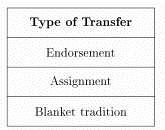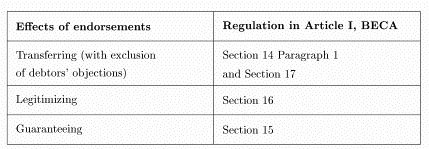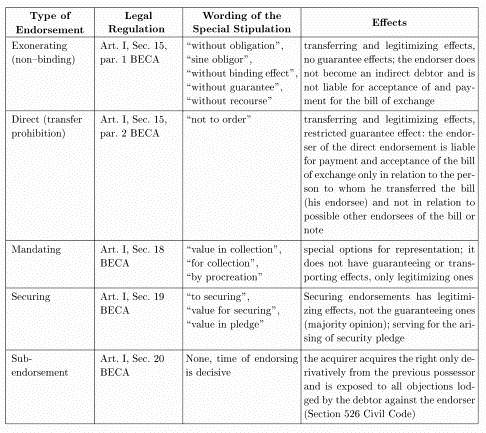Bill of Exchange Law
20. Types of Transfer of Bills of Exchange
Table: Types of Transfer of Bills of Exchange

Possession of securities may be generally transferred in three ways: by endorsement, by a written contract (assignment of a debt) or merely by passing over on the basis of an informal agreement. Some securities may be transferred, depending on the circumstances, by all these methods, with some of them there is not such a choice. For example, an interim security, as a security to order, is only transferable by endorsement.
The bill of exchange is among those securities that are transferable by all three methods mentioned above. The principal method, and usual one, is endorsement. In this way a bill of exchange may be transferred even if it does not include the clause "to order". The other two ways of transfer - by assignment of a debt and by merely passing the rights over - are possible only when all preconditions set by the law are met.
The bill of exchange is transferred by assignment of a debt only if it includes a clause about prohibition of endorsement - the so-called restrictive clause (see Article I, Section 11 BECA). We usually find it in the wording "not to order" before the name of the creditor. Bills of exchange with such a clause of the drawer are called restrictive bills of exchange.
The situation is more complicated when the bill of exchange is only passed over. This is the most informal and fastest way of transfer of rights relating to bills of exchange called also "blanket tradition" (see Article I, Section 14, and Paragraph 2, Letter c/ BECA). Blanket tradition is admissible with bills of exchange where the line of endorsements is completed with a blanket endorsement. The possessor may then decide to pass the bill over to another person without writing anything on it. Ordinary or restrictive bills of exchange cannot be transferred in this way as they have the form of security on Bearer.
a) Endorsements
Every bill of exchange, even if not expressly drawn to order, may be transferred by the endorsement. The participants of endorsement are endorser and endorsee. By endorsement the endorser transfers the bill of exchange to the endorsee (provided that other legal preconditions are met). The first endorser is the payee and the second one is always the endorsee from the previous endorsement.
From the formal point of view the endorsement is based on a written statement of the transferor (the endorser). The endorsement may be inserted in the bill, in an appendix (Article I, Section 13, Paragraph 1, and BECA) or in a copy (Article I, Section 67, Paragraph 3, and BECA).
The endorsement must always aim at a transfer of all rights relating to the bill of exchange and partial endorsements are invalid (Article I, Section 12, Paragraph 2, BECA). There is a different situation with the conditional endorsement: a possible condition is seen as unwritten pursuant to quite a hard provision of Article I, Section 12, Paragraph 1, BECA, and it cannot be taken into consideration.
A typical endorsement includes a clause of transfer ("After me to order"), the information about the endorsee, (i.e. the information about the person to whom the bill is transferred) and the signature of the endorser. The endorsement may also have the form of a blanket endorsement. Whereas the completed endorsement expressly states the endorser we basically do not find his identification in blanket endorsements. The blanket endorsement consists either in the mere transfer clause and the signature of the endorser ("After me to order." + the endorser's signature) or it may even be reduced to the mere signature of the endorser on the reverse of the bill of exchange.
Table: Effects of endorsements

Table: Special Types of Endorsements

Model of common Endorsement

Model of Exonerating Endorsement

b) Blanket tradition
It is not possible to transfer any bill of exchange by the blanket tradition. A necessary precondition is an endorsement in blank which does not contain the name of the endorsee. There are three options for the holder in this situation: the holder may fill in the endorsement either with his own name or with the name of some other person, or re-endorse the bill, or transfer the bill to a third person without filling in the blank endorsement and without endorsing it (Article I, Section 14, Paragraph 2, BECA). It is the third option that is designated as blanket tradition. In such a situation the bill behaves in fact as a security to Bearer without actually being it because the blanket endorsement may be filled in anytime and the bill may be re-endorsed.The blanket tradition has transferring and legitimizing effects as the endorsement (Article I, Section 16, Paragraph 1, BECA) but, quite understandably, it completely lacks guaranteeing effects (the transferor is not signed in the bill).
c) Transfer of bill rights by assignment
Pursuant to Article I, Section 11, Paragraph 2, BECA, the drawer may exclude endorsement by the so-called restrictive clause and the bill is then transferable by assignment. The law demonstratively states the wording: "not to order". In practice, we usually find it under the designation of the creditor in bill ("Pay not to order to Mr. Jan Èerny").By the restrictive clause the bill of exchange turns into a security on Bearer. Another transfer is then possible only in the form and with the effects of assignment (Sections 524-530, Civil Code). For the contract of assignment to be valid a written form is required by the law (Section 524, Paragraph 1, Civil Code).